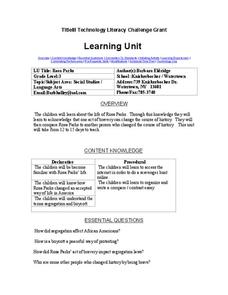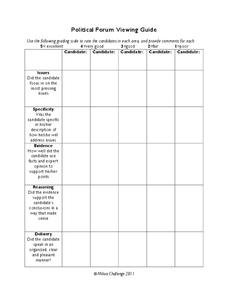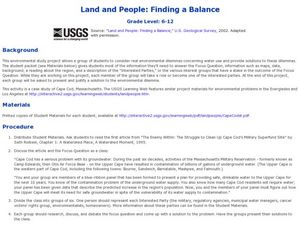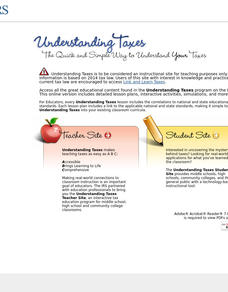Curated OER
Words in the News: Education Bill Backs India's Poor
Students discuss different groups of people who have been discriminated in the history of the world. They practice using new vocabulary words. In groups, they match the word with its definition.
Curated OER
Ancient Animals
Students explore ancient rock art in Arkansas. Through discussion, research, and hands on activities, they identify the animals and stylized features of rock art found in Arkansas. Students identify the various habitats of he animals...
Curated OER
Rosa Parks
Students complete a variety of written and discussion activities regarding Rosa Parks and the Alabama bus boycott and how they changed an accepted way of life in America.
Curated OER
Words In The News: Beverly Hills Smoking Ban
Students read news articles about the proposed smoking ban in California restaurants. After discussing the news report, they role-play scenarios about nonsmoking situations. In groups, they brainstorm the pros and cons of smoking bans...
Curated OER
Estuary
Students discuss how the meanings of words can change over time. Through discussion, lecture, and activities, they identify how words can have multiple meanings and how those meanings can be changed over time. Lesson resources are...
Mikva Challenge
Political Forum Viewing Guide
Is there a way to determine a winner of a political debate? Use a helpful rubric to evaluate the issues, specificity, evidence, reasoning, and delivery of candidates in a debate. After assessing each person's performance, high schoolers...
American Statistical Association
A Sweet Task
Candy is always an effective motivator! A fun math activity uses M&M's and Skittles to explore two-way frequency tables and conditional probability. The candy can serve a dual purpose as manipulatives and experimental data.
Civil War Trust
Civil War Newspaper
One photograph can represent so much more than the images on the film. Eighth graders select a photograph from the Civil War era and conduct additional research based on the subject matter from the picture. Once they complete the...
Houghton Mifflin Harcourt
One Land, Many Trails: Challenge Activities (Theme 5)
Bring history to life through literature. The first in a series of three challenge activities designed to accompany Theme 5: One Land, Many Trails does just that through unique projects connected to historical fiction and nonfiction...
California Department of Education
Due Dates, Deadlines, and Decisions
Get high schoolers thinking about their post-secondary plans with a lesson plan that teaches them how to navigate the application and financial aid process. They create a junior/senior calendar identifying time-sensitive tasks,...
Curated OER
Fracking: Positive or Negative Impact?
Your teenagers may have heard of fracking, but do they really know what it is? And could they debate the benefits and risks? Educate your environmental science class with a lesson about hydraulic fracturing, non-renewable energy sources,...
Insurance Zebra
Insurance Curriculum for Middle and High School Teachers
Liability, deductible, premium ... what do these words mean, and how do they relate to insurance? Scholars complete a pre-test, matching vocabulary activity, and insurance timeline worksheet and become familiar with these terms. Next,...
Poetry Class
Eccentricity and Sound
What do Lady Gaga and Dame Edith Sitwell have in common? As they examine Sitwell's poetry, class members learn that the similarities are far more than their unique appearance.
Humanities Texas
Primary Source Worksheet: Theodore Roosevelt, Excerpt from “The Square Deal” Speech
Talk about a timely resource! As part of a series of primary source exercises, individuals read and respond to questions about Theodore Roosevelt's "The Square Deal" speech. Roosevelt reminds us of what our social system should be.
Curated OER
Technology: Researching Inventions
Third graders, in groups, discuss their chosen invention and how it works. In preparation for a Powerpoint presentation, they research the inventor, the impact of the invention on society, and what llife would be like without it....
Curated OER
Land and People: finding a Balance
Students discuss "The Enemy Within: The Struggle to Clean up Cape Cod's Military Superfund Site" by Seth Rolbein by figuring out how there should be safe groundwater. In this science lesson, students pretend to be an interested party for...
Curated OER
Design a Paper Airplane
Students study examples of paper airplanes and then create their own paper airplane models.
Curated OER
Islam & Islamophobia
Young scholars explore the concept of Islamophobia. In this Islam lesson, students watch an online video to understand religious dress, Muslim practices, and the discrimination facing American Muslims. Young scholars disucss their...
Curated OER
Addressing Community Problems
Students discuss how to solve problems in the community. In this character education lesson, students brainstorm major problems in their neighborhoods and list them on the board. Students are divided into groups and focus on one topic to...
Curated OER
Bird Up
Third graders identify basic physical and behavioral characteristics of birds and how they adapt to their environments. To organize and share scientific information with peers. They discuss similarities and differences among birds....
Curated OER
Sports Safety Pamphlets
Students create pamphlets highlighting safety guidelines for specific sports. They define the word pamphlet, study safety guidelines for several sports, and create pamphlets highlighting safety guidelines for several sports.
Curated OER
The Politics Of Taxation
Students explain that taxation involves a compromise of conflicting goals and that lobbyists can influence lawmakers' decisions about taxes. They can explain why people of similar incomes often pay different tax rates and work in teams...
Curated OER
Sinking City of Venice
Students view a video clip about Venice's sinking problem. They identify possible solutions and discuss the difficulity in solving it. They also complete a worksheet to end the instructional activity.
Curated OER
Tell It Like It Is
Students consider the accuracy of the Web sites they regularly use, then prepare for a formal debate on the reliability of Wikipedia and similar Web sites. For homework, they prepare note cards and practice delivering their orations.

























